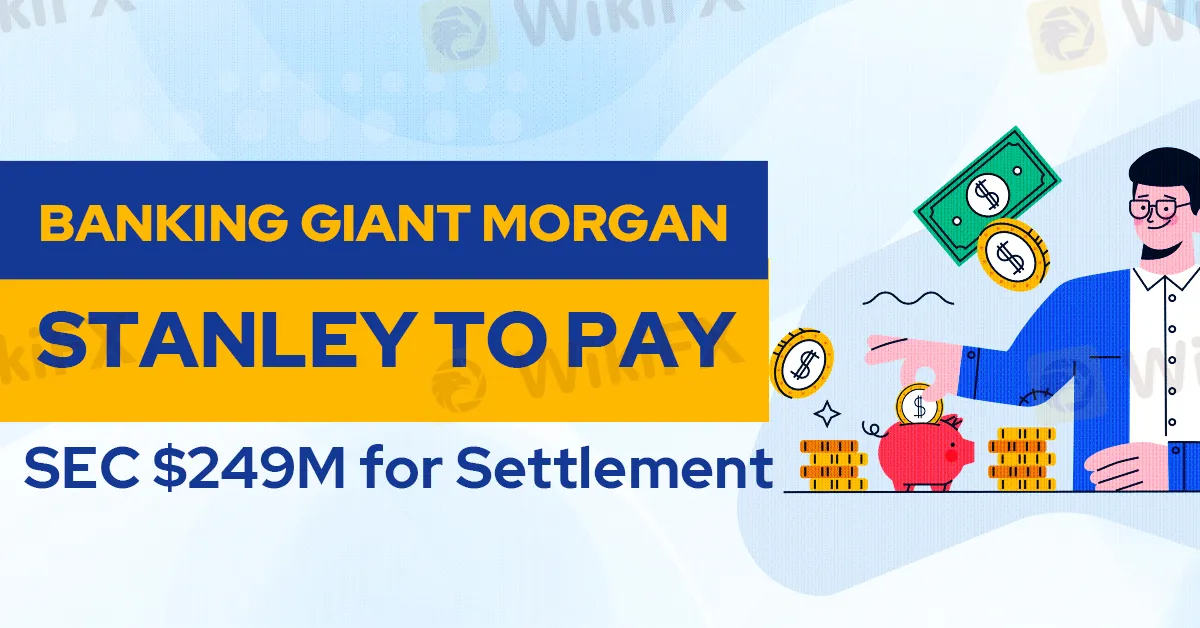简体中文
繁體中文
English
Pусский
日本語
ภาษาไทย
Tiếng Việt
Bahasa Indonesia
Español
हिन्दी
Filippiiniläinen
Français
Deutsch
Português
Türkçe
한국어
العربية
Banking Giant Morgan Stanley to Pay SEC $249M for Settlement
Abstract:This article unravels the Securities and Exchange Commission's charges against Morgan Stanley & Co. LLC and its former equity syndicate desk head, Pawan Passi, exposing a multi-year fraud involving the unauthorized disclosure of confidential information in the realm of block trades.

Last week, the Securities and Exchange Commission (SEC) brought charges against Morgan Stanley & Co. LLC, a prominent investment banking giant, and Pawan Passi, the former head of its equity syndicate desk. The charges pertain to a lengthy period of fraud involving the disclosure of confidential information related to the sale of substantial quantities of stock, commonly referred to as “block trades.” Additionally, the SEC accused Morgan Stanley of neglecting to enforce its policies addressing the misuse of material non-public information linked to block trades.
Block trades typically involve the private arrangement and execution of a substantial number of shares of a company's stock outside the public markets.
According to the SEC's findings, spanning from June 2018 to August 2021, Passi and a subordinate on Morgan Stanley's equity syndicate desk revealed non-public, potentially market-moving information about imminent block trades to select buy-side investors. This disclosure occurred despite confidentiality requests from the sellers and Morgan Stanley's own policies concerning confidential information handling.

The SEC's orders assert that Morgan Stanley and Passi shared the block trade information with the expectation that the buy-side investors would utilize it to “pre-position” themselves by taking significant short positions in the stock slated for the impending block trade.
As per the SEC orders, in the event that Morgan Stanley proceeded to purchase the block trade, the buy-side investors would then seek and receive allocations from Morgan Stanley to cover their short positions. This pre-positioning strategy effectively mitigated Morgan Stanley's risk in acquiring block trades.
The SEC's order also notes Morgan Stanley's failure to implement effective information barriers, preventing material non-public information about specific block trades from being transmitted by the equity syndicate desk, situated on the private side of Morgan Stanley, to a trading division on the public side. Consequently, the firm could not adequately scrutinize whether trades by that division, made while the equity syndicate desk was in talks with selling shareholders regarding potential block trades, were based on confidential discussions.
The SEC's order against Morgan Stanley determines that the firm willfully violated Sections 10(b) and 15(g) of the Securities Exchange Act of 1934 and Rule 10b-5(b) thereunder. As a result, the firm is censured and required to pay around $138 million in disgorgement, approximately $28 million in prejudgment interest, and an $83 million civil penalty.
Concerning Pawan Passi, the SEC's order finds him willfully violating Section 10(b) of the Exchange Act and Rule 10b-5 thereunder. He is mandated to pay a $250,000 civil penalty and faces associational, penny stock, and supervisory bars.
In a simultaneous development, the U.S. Attorney's Office for the Southern District of New York announced criminal resolutions with both Morgan Stanley and Passi. The SEC's ordered disgorgement and prejudgment interest for Morgan Stanley will be considered partially satisfied by the firm's forfeiture and restitution, totaling $136,531,223, as part of its criminal resolution.

Disclaimer:
The views in this article only represent the author's personal views, and do not constitute investment advice on this platform. This platform does not guarantee the accuracy, completeness and timeliness of the information in the article, and will not be liable for any loss caused by the use of or reliance on the information in the article.
Read more

WikiFX "3·15 Forex Rights Protection Day" – Official Release of the Blacklist
WikiFX, as a globally leading forex investment ecosystem service platform, has always been committed to providing fair and authoritative broker verification services for forex investors, while offering solid rights protection support for every victim of forex investment. On February 26, 2025, WikiFX once again launched its annual "3·15 Forex Rights Protection Day" event, aiming to empower forex investors to speak out and defend their rights through open, transparent, and robust means.

Nigeria’s Oil and Gas Sector Gains Momentum
Nigeria’s oil and gas industry is experiencing a surge in investment, fueled by policy reforms and international collaboration, paving the way for continued energy expansion.

The Global Tariff War Escalates: Who Suffers the Most?
The global trade war is intensifying as countries continue to raise tariffs, aiming to protect their own economies while creating greater market uncertainty. In this tit-for-tat game, who is truly bearing the brunt?

Immediate Edge Review 2025: Is it safe?
Launched in 2019, Immediate Edge claims to be an automated cryptocurrency trading platform using AI technology for crypto trading services. The platform requires a minimum deposit of $250 to begin trading, which is relatively expensive for many investors. During its short operation, Immediate Edge failed to establish a positive reputation. The platform has undergone frequent domain changes and has repositioned itself as an intermediary connecting users with investment firms—a move that appears designed to obscure its actual operations. Immediate Edge restricts services to investors from the United States; it remains accessible to users in other regions.
WikiFX Broker
Latest News
How to Avoid Risks from Scam Brokers in Forex Investment
Will Trump's Trade Policies Fuel Inflation? BlackRock Warns of Economic Risks
WikiFX "3·15 Forex Rights Protection Day" – Official Release of the Blacklist
Why Scammers Let You Win Before Taking It All
A Must-To-Watch Top Trading Pairs This 2025
Currency Calculator






